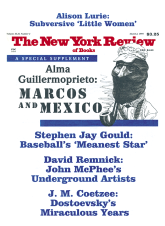In response to:
Down with Memory Lane from the December 22, 1994 issue
To the Editors:
Frederick Crews’ article on repressed memory [NYR, November 17, 1994] inaccurately described my case (Cheit v. San Francisco Boys Chorus) and, as I argued in my letter to the editor [NYR, December 22, 1994], engaged in a close-minded method of interpretation. Crews admits that his article left a misleading impression, yet he found it necessary in responding to my letter to concoct an ulterior “motive” for my criticism. Unfortunately, Professor Crews did not employ the “refreshingly sane” approach of “methodical study of facts.” Instead, he jumped to conclusions that are demonstrably untrue. Had Crews bothered to research the case he described as “closely watched,” he would have discovered not only that I distinguished carefully between strong and weak allegations against a multiplicity of possible perpetrators at the boys chorus camp, but that I did so with particular sensitivity to the problem of false accusations. Would that Crews had done likewise before launching his diversionary and personal attack.
The sooner that our society is willing to engage in a serious and open-minded examination of each and every allegation of child sexual abuse, the sooner we will rise above the one-sided and distorted perspectives of extremists on both sides of the issue. That is the only way to make progress in combating the related problems of sexual abuse and of false allegations. Journalists and academics can assist in this worthwhile endeavor by aspiring to a standard higher than the one embodied in Crews’ article and subsequent letter.
Professor Ross E. Cheit
Brown University
Providence, Rhode Island
Frederick Crews replies:
Neither publicly nor privately have I ever criticized Ross Cheit’s investigation of his childhood abuse. Nor do I doubt that he regards himself as an unbiased student of other cases. But he gave me reason to think otherwise when, in phoning me last September 7, he heaped scorn on critics of the recovered memory movement; placed no emphasis on the risks of false memory while repeatedly citing the vast number of pedophiles who remain at large; and asserted, erroneously, that the steamrollered Paul Ingram had freely confessed to having molested an unrelated four-year-old girl. His uncomprehending anger toward my essay has only deepened my impression of his solidarity with self-perceived Survivors.
Cheit’s advocacy of “a serious and open-minded examination of each and every allegation of child abuse” looks uncontroversial enough. What he means, however, is that charges emanating from therapeutically coerced “recovered memories” of remote and otherwise unbelievable events should be taken just as seriously as charges against someone who has been caught molesting a child. I disagree, and not only because innocent people are horrifically damaged by such “examinations.” Given the finite resources available for prosecuting real abusers, Cheit’s own goal of exposing the guilty would be best served by setting aside all cases that rest solely on beliefs acquired in psychotherapy.
This Issue
March 2, 1995



